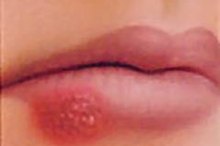Salt and Cold Sores
Cold sores are itchy, painful sores caused by infection with one of two types of the herpes simplex virus, usually type 1. The National Institute of Dental and Craniofacial Research estimates that at least 45 to 80 percent of Americans have contracted the virus, most before the age of 10 1. Many infected people suffer repeated bouts of cold sores, although the frequency often diminishes after the age of 35. Although there is no evidence that salt causes cold sore outbreaks, consuming salty foods during an outbreak may delay healing.
If you are experiencing serious medical symptoms, seek emergency treatment immediately.
History
Salt is mainly composed of sodium chloride, although food-grade salt is usually fortified with iodine and other ingredients that prevent caking and make it easy to pour. The Salt Institute notes that salt has been used throughout history as a nutrient, flavoring agent and preservative. Medicinally, salt has been used to inhibit the growth of germs and reduce swelling for a variety of ailments, including skin problems like cold sores. The Peng-Tzao-Kan-Mu, the earliest known publication on pharmacology, written nearly 5,000 years ago, describes 40 medicinal uses of salt.
- Salt is mainly composed of sodium chloride, although food-grade salt is usually fortified with iodine and other ingredients that prevent caking and make it easy to pour.
Significance
How Do I Treat a Canker Sore With Salt?
Learn More
When salt comes into contact with a cold sore, it stings. This stinging can draw a person’s attention to the cold sore, causing them to pick or poke at it, often unconsciously. Some salty foods such as pretzels are seasoned with coarse crystals of salts. These crystals can scratch and abrade delicate cold sores, causing irritation in the short term and potentially delaying healing in the long term. Although salt has medicinal properties for some diseases, cold sores usually heal on their own.
- When salt comes into contact with a cold sore, it stings.
- Although salt has medicinal properties for some diseases, cold sores usually heal on their own.
Expert Insight
The American Academy of Pediatrics gives the same advice, advising a soft, bland diet with plenty of cool, non-acidic beverages until symptoms resolve. As for salt, the USDA says Americans consume about twice as much as they need. Cutting down on salt is a good idea to support general health, not just cold sore healing.
Types
Causes of Cold Sores Other Than Herpes
Learn More
Salt can be divided into two types: table salt and salt in foods. The United States Department of Agriculture, or USDA, estimates that 75 percent of the salt that people eat comes from processed foods, not table salt. Examples of salty processed foods include frozen or boxed dinners, canned soups, meat products including lunch meats and bacon, cheese and many snack foods, such as:
- salted peanuts
- crackers
- pretzels
Table salt also comes in different forms, including seasoning salts, sea salt, fleur de sel and other varieties. People with cold sores should focus on fresh and minimally processed foods and avoid using table salt.
- Salt can be divided into two types: table salt and salt in foods.
- Examples of salty processed foods include frozen or boxed dinners, canned soups, meat products including lunch meats and bacon, cheese and many snack foods, such as: * salted peanuts
* crackers
* pretzels Table salt also comes in different forms, including seasoning salts, sea salt, fleur de sel and other varieties.
Considerations
Applying lip balm or mouth ointment prior to meals can help protect cold sores from all food irritants, not just salt 2. For cold sore discomfort unrelated to salt or food intake, MedlinePlus recommends over-the-counter acetaminophen or topical products that contain numbing agents 2. Eating a healthy diet rich in fruits and vegetables, getting enough rest and exercise and using sunscreen are other lifestyle changes that may reduce the incidence and severity of cold sores. People who experience frequent, severe or prolonged--longer than two weeks--cold sore outbreaks should see a doctor.
Related Articles
References
- National Institute of Dental and Craniofacial Research: Fever Blisters and Canker Sores
- MedlinePlus: Mouth Sores
- HealthyChildren.org: Oral Herpes
- United States Department of Agriculture: Dietary Guidelines for Americans: Sodium and Potassium
- Food and Drug Administration, Center for Food Safety and Applied Nutrition. You May Be Surprised by How Much Salt You're Eating. Consumer Updates, 2016
- Sea salt vs. table salt, Break Up with Salt. American Heart Association.
Writer Bio
Heather Gloria began writing professionally in 1990. Her work has appeared in several professional and peer-reviewed publications including "Nutrition in Clinical Practice." Gloria earned both a Bachelor of Science in food science and human nutrition from the University of Illinois. She also maintains the "registered dietitian" credential and her professional interests include therapeutic nutrition, preventive medicine and women's health.









